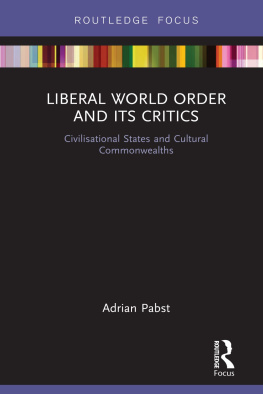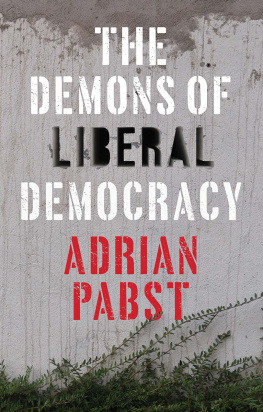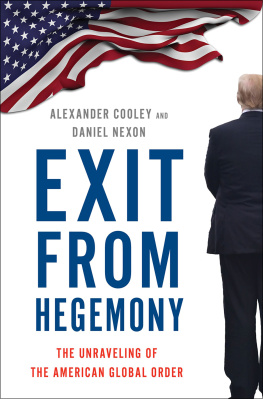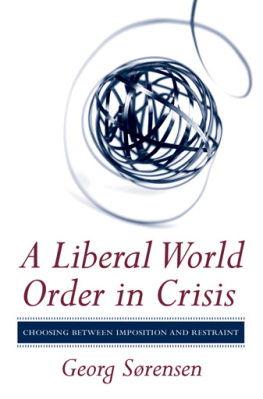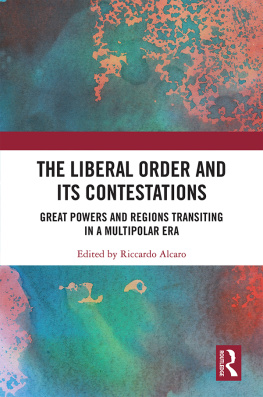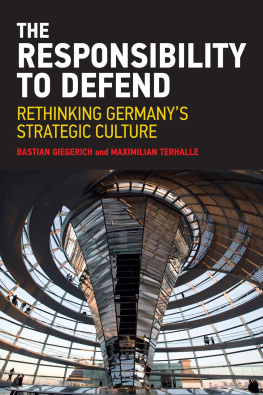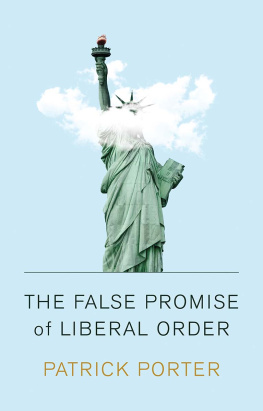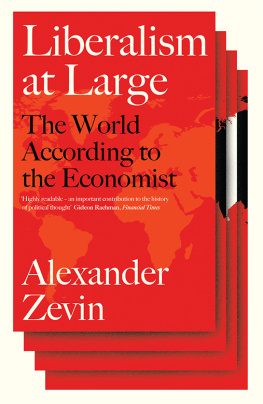Liberal World Order and Its Critics
Liberals blame the retreat of the liberal world order on populists at home and authoritarian leaders abroad. Only liberalism, so they claim, can defend the rules-based international system against demagogy, corruption and nationalism. This provocative book contends that the liberal world order is illiberal and undemocratic intolerant about the cultural values of ordinary people in the West and elsewhere while concentrating power in the hands of unaccountable Western elites and Western-dominated institutions.
Under the influence of contemporary liberalism, the international system is fuelling economic injustice, social fragmentation and a worldwide culture war between globalists and nativists. Liberals, far from defending rules, have broken international law and imposed their version of market fundamentalism and democracy promotion by military means. Liberal civilisation has fuelled resentment across the world by imposing a narrow worldview that pits cultures against one another. To avoid a descent into a violent culture clash, this book proposes radical ideas for international order that take the form of cultural commonwealths social bonds and cross-border cultural ties on which international trust and cooperation depends. The books defence of an older order against both liberals and nationalists will speak to all readers trying to understand our age of anger.
This book will be of key interest to scholars, students and readers of liberalism, political theory and democracy, and more broadly to comparative politics and international relations.
Adrian Pabst is Reader in Politics at the School of Politics and International Relations, University of Kent, UK.
World Politics and Dialogues of Civilizations Series
Series Editor: Raffaele Marchetti
LUISS Guido Carli University, Italy
This new series aims to explore alternative models of the social, political and economic developments at regional and world levels in order to advance theoretical understanding, promote political debate, and provide policy-oriented advice. It focuses on six broad macro-areas: policies, institutions, and shared prosperity; infrastructure for global inclusive development; the economy beyond the failure of conventional models; East and West, North and South; civilisations against the threat of social barbarism; life space for humanity.
The series is linked to the research carried out by the Dialogue of Civilizations-DoC Research Institute (Berlin) but is open to external contribution.
Debating Migration to Europe
Welfare vs Identity
Raffaele Marchetti
Liberal World Order and Its Critics
Civilisational States and Cultural Commonwealths
Adrian Pabst
For more information about this series, please visit: www.routledge.com/World-Politics-and-Dialogues-of-Civilizations/book-series/DOC
Liberal World Order and Its Critics
Civilisational States and Cultural Commonwealths
Adrian Pabst
First published 2019
by Routledge
2 Park Square, Milton Park, Abingdon, Oxon OX14 4RN
and by Routledge
52 Vanderbilt Avenue, New York, NY 10017
Routledge is an imprint of the Taylor & Francis Group, an informa business
2019 Adrian Pabst
The right of Adrian Pabst to be identified as author of this work has been asserted by him in accordance with sections 77 and 78 of the Copyright, Designs and Patents Act 1988.
All rights reserved. No part of this book may be reprinted or reproduced or utilised in any form or by any electronic, mechanical, or other means, now known or hereafter invented, including photocopying and recording, or in any information storage or retrieval system, without permission in writing from the publishers.
Trademark notice : Product or corporate names may be trademarks or registered trademarks, and are used only for identification and explanation without intent to infringe.
British Library Cataloguing-in-Publication Data
A catalogue record for this book is available from the British Library
Library of Congress Cataloging-in-Publication Data
A catalog record has been requested for this book
ISBN: 978-0-367-02993-7 (hbk)
ISBN: 978-0-429-01985-2 (ebk)
Typeset in Times New Roman
by Deanta Global Publishing Services, Chennai, India
In the intercourse between nations, we are apt to rely too much on the instrumental part. We lay too much weight upon the formality of treaties and compacts. We do not act much more wisely when we trust to the interests of men as guarantees of their engagements. [] Men are not tied to one another by papers and seals. They are led to associate by resemblances, by conformities, by sympathies. It is with nations as with individuals. Nothing is so strong a tie of amity between nation and nation as correspondence in laws, customs, manners, and habits of life. They have more than the force of treaties in themselves. They are obligations written in the heart. They approximate men to men, without their knowledge, and sometimes against their intentions. The secret, unseen, but irrefragable bond of habitual intercourse holds them together even when their perverse and litigious nature sets them to equivocate, scuffle, and fight, about the terms of their written obligations. [] There have been periods of time in which communities, apparently in peace with each other, have been more perfectly separated than, in later times, many nations in Europe have been in the course of long and bloody wars. The cause must be sought in the similitude throughout of religion, laws, and manners. At bottom, these are all the same. The writers on public law have often called this aggregate of nations a Commonwealth. They had reason.
Edmund Burke, The First Letter on a Regicide Peace (1796)
Contents
This book is the fruit of conversations with friends and colleagues over many years. I would like to thank Will Bain, Richard Beardsworth, Russell Berman, Maxim Bratersky, Alan Cafruny, Tom Casier, Christopher Coker, Matthew Dal Santo, Iain Ferguson, Trine Flockhart, Renato Flores, Maurice Glasman, Paul Grenier, Leonid Grigoryev, Sergey Karaganov, Andrej Krickovic, Anthony F. Lang Jr, Anatol Lieven, Tim Luke, Fyodor Lukyanov, John Mearsheimer, John Milbank, James Noyes, Vassilios Paipais, David Pan, Victoria Pavliushina, Richard Sakwa, Kiron Skinner, Dmitry Suslov, Nandan Unnikrishnan and Xin Zhang, as well as my father Reinhart and my godfather Klaus Wittmann.
I am very grateful to my colleagues of the World Public Forum and the Dialogue of Civilizations Research Institute, in particular Fred Dallmayr, Alexander Dubowy, Piotr Dutkiewicz, Ekaterina Gerus, John Laughland, Grgory Jullien, Raffaele Marchetti, Manuel Montes, Ashis Nandy, Fabio Petito, Vladimir Popov, Alexander Rahr, Peter Schulze, Walter Schwimmer, Jens Wendland and Vladimir Yakunin.
Earlier versions of some of the chapters were presented at various conferences and workshops. Chapter 1 is based on a paper I gave at a conference on The return of spheres of influence? Continuity and change in geopolitics at the University of Helsinki on 10 June 2016. Chapter 2 is a much revised version of a paper presented at a workshop on An emerging new world order? Building blocs, drivers and perspectives hosted by the Dialogue of Civilizations Research Institute in Berlin on 17 June 2017.
An earlier version of Chapter 3 is a paper that I gave at a conference on Inventing hegemonies: Theories and approaches at the University of Warsaw on 21 May 2018. Chapter 4 is based on a paper I delivered at a conference on The future of Western civilization at the Hoover Institution, Stanford University on 8 May 2017. I would like to thank the organisers and participants for their comments and suggestions that have helped me to develop my ideas.

